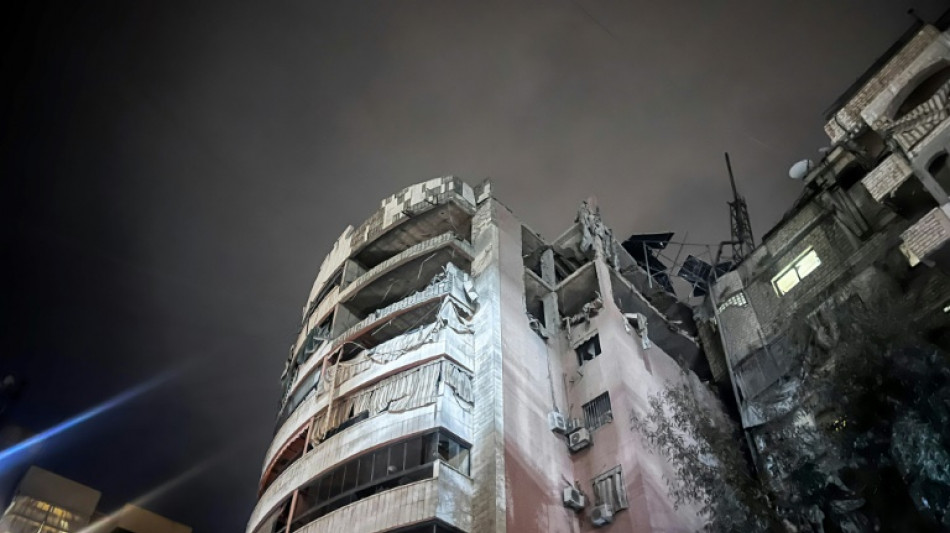
Hezbollah official targeted in deadly Israeli strike on Beirut

An Israeli strike Tuesday killed three people, Lebanon said, as a source close to Hezbollah said one of the group's officials was targeted in the second such strike on south Beirut during a fragile four-month ceasefire.
The attack came without warning at around 3:30 am (0030 GMT) during the Eid al-Fitr Muslim holiday marking the end of the Ramadan fasting period.
It struck after Israel also raided Beirut's southern suburbs -- a bastion of support for Lebanon's Iran-backed Hezbollah armed group -- last Friday after issuing an evacuation warning.
Lebanon's health ministry said the latest strike killed three people and wounded seven others.
The top two floors of a multi-storey building were destroyed and debris covered the street, an AFP journalist reported from the scene.
Panicked residents poured out of their homes as rescue workers helped the wounded.
The Israeli military said "the strike targeted a Hezbollah terrorist who had recently directed Hamas operatives and assisted them in planning a significant and imminent terror attack against Israeli civilians," in a joint statement with the domestic Shin Bet security agency.
A source close to Hezbollah, requesting anonymity as they were not authorised to brief the media, told AFP the strike "targeted Hassan Bdair, Hezbollah's deputy head for the Palestinian file" who was "at home with his family".
- 'Clear breach' -
Lebanese President Joseph Aoun condemned the strike and called on his country's allies to support "our right to full sovereignty".
Prime Minister Nawaf Salam said the attack was a "clear breach" of a ceasefire deal that largely ended more than a year of hostilities between Israel and Hezbollah.
Without identifying the alleged Hezbollah operative, Israel's military said it "acted to eliminate him and removed the threat", just days after striking Beirut's southern suburbs in response to rocket fire from Lebanon which it blamed on the Lebanese militant group.
Hezbollah lawmaker Ibrahim Musawi said Lebanese authorities must "make the international community bear its responsibility and take the highest level of measures to guarantee the safety of the Lebanese".
Israeli Prime Minister Benjamin Netanyahu had warned the country's military would "strike everywhere in Lebanon against any threat" in response to the rocket fire.
Israel has continued to carry out strikes on southern and eastern Lebanon in the months since the November 27 ceasefire, hitting what it says are Hezbollah military targets that violated the agreement.
Hezbollah began firing rockets at Israel on October 8, 2023 in support of its ally Hamas following the Palestinian group's unprecedented attack on southern Israel that sparked the war in Gaza.
After nearly a year of cross-border hostilities, Israel dramatically scaled up its campaign in September, heavily bombing Hezbollah strongholds in south and east Lebanon and Beirut's southern suburbs, and later sending in ground troops.
- 'Enforce' truce -
United Nations Special Coordinator for Lebanon Jeanine Hennis-Plasschaert said that "further escalation is the last thing anyone needs".
In a statement on X, she said the "only viable route forward" was UN Security Council Resolution 1701, which ended a 2006 war between Israel and Hezbollah and served as the foundation of the November truce.
Hezbollah leader Naim Qassem on Saturday condemned the resumption of Israeli strikes on Beirut's southern suburbs.
"This aggression must end. We cannot allow this to continue," he said.
Israel's military said Friday two "projectiles" were fired towards Israel, with one intercepted and the other falling inside Lebanon.
It was the second time rockets had been launched at Israel from Lebanon since the ceasefire, after an earlier incident on March 22.
Hezbollah denied involvement on both occasions.
Israeli Defence Minister Israel Katz has said Lebanon's "government bears direct responsibility for any fire toward the Galilee" and if it does not enforce the ceasefire, "we will enforce it".
Lebanon's military later Friday said it had identified the site of the rocket launch, just north of the Litani River.
On Sunday Lebanon's General Security agency said it had arrested several suspects.
Under the terms of the ceasefire, Israel was due to complete its withdrawal from Lebanon by February 18 after missing a January deadline, but it has kept troops in five places it deems "strategic".
The agreement also required Hezbollah to pull its forces north of the Litani River, about 30 kilometres (20 miles) from the Israeli border, and dismantle any remaining military infrastructure in the south.
The Lebanese army has deployed in the south as the Israeli military pulled back.
B.Dietrich--BlnAP

 London
London

 Manchester
Manchester
 Glasgow
Glasgow
 Dublin
Dublin
 Belfast
Belfast
 Washington
Washington
 Denver
Denver
 Atlanta
Atlanta
 Dallas
Dallas
 Houston Texas
Houston Texas
 New Orleans
New Orleans
 El Paso
El Paso
 Phoenix
Phoenix
 Los Angeles
Los Angeles



